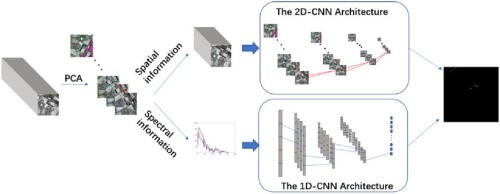Hyperspectral anomaly detection has garnered much research in recent years due to the excellent detection ability of hyperspectral remote sensing in agriculture, forestry, geological surveys, environmental monitoring, and battlefield target detection. The traditional anomaly detection method ignores the non-linearity and complexity of the hyperspectral image (HSI), while making use of the effectiveness of spatial information rarely. Besides, the anomalous pixels and the background are mixed, which causes a higher false alarm rate in the detection result. In this paper, a hyperspectral deep net-based anomaly detector using weight adjustment strategy (WAHyperDNet) is proposed to circumvent the above issues. We leverage three-dimensional convolution instead of the two-dimensional convolution to get a better way of handling high-dimensional data. In this study, the determinative spectrum–spatial features are extracted across the correlation between HSI pixels. Moreover, feature weights in the method are automatically generated based on absolute distance and the spectral similarity angle to describe the differences between the background pixels and the pixels to be tested. Experimental results on five public datasets show that the proposed approach outperforms the state-of-the-art baselines in both effectiveness and efficiency.

Structure of the 2D-CNN model in hyperspectral anomaly detection with the HSI dataset. (Image by XIOPM)


